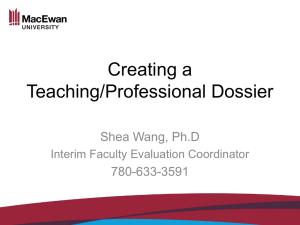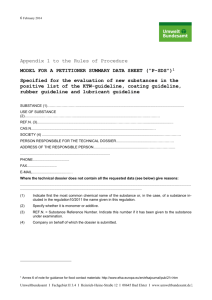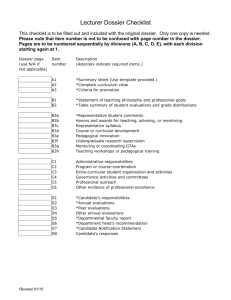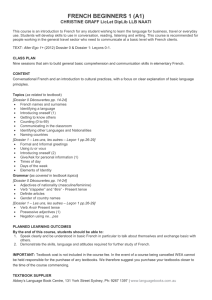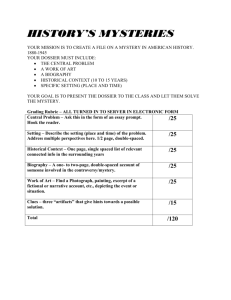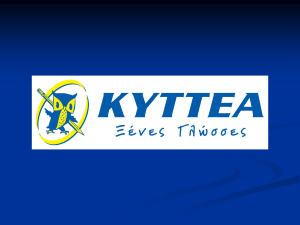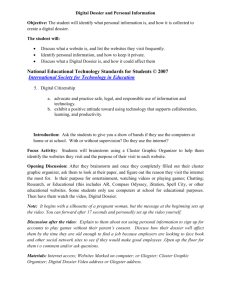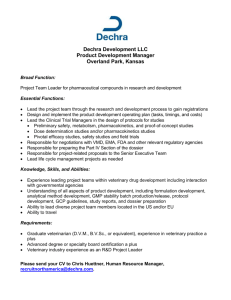Evaluation is guided by the philosophy that we
advertisement
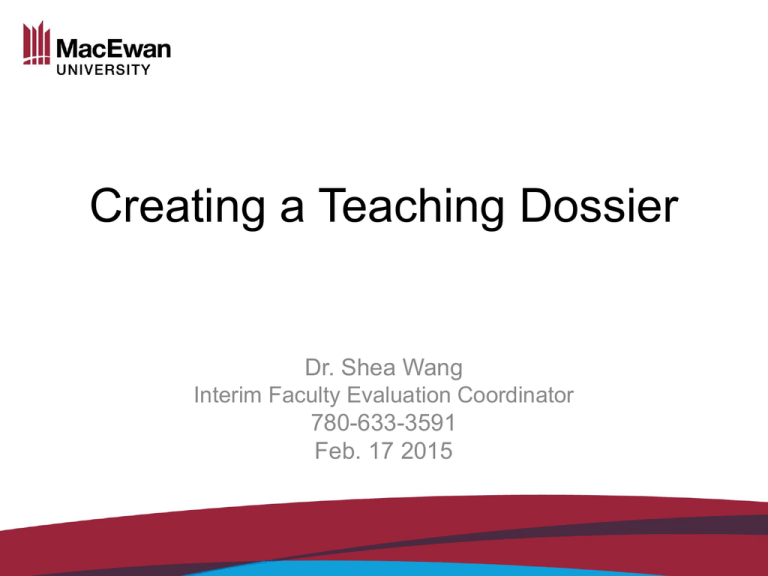
Creating a Teaching Dossier Dr. Shea Wang Interim Faculty Evaluation Coordinator 780-633-3591 Feb. 17 2015 Faculty Evaluation at MacEwan Five elements to evaluation: • Teaching dossier • Peer review • Annual report • Student Course Evaluation Surveys • Stakeholder review (Appointment Review and Promotion Committees) Principles of Policy C5065 Evaluation is guided by the philosophy that we: • promote a culture of teaching & learning • foster professional development & scholarly activity • promote fairness & transparency • benefit faculty members through timely & accurate feedback • comply with Collective Agreement • undertake as a process involving multiple stakeholders & a variety of assessment approaches What is a Teaching Dossier? Policy C5065: • “A teaching dossier is a concise, evidencebased record of teaching activities and other academic accomplishments prepared by a faculty member.” Criteria for Continuation of Probation, Continuing, and Promotion • Statement of the case for continuation of probation, continuing status, or promotion (assessment of career- duties assigned) • CV – entire academic career, format approved by AGC • Record of academic & professional accomplishments (continuing status application) • Teaching practice [Article 11.0; 11.3 (a)-(f)- teaching dossier material] • Service (level and significance of participation/responsibility, workload, demands on time, a description of the setting) • Scholarly activity (e.g., publications, research grants, presentations, exhibitions, performances, etc.) • Professional activity if relevant to assigned workload 2014-17 CA:10.1.8 (p.43-44) 19.4.5 (p.49) Why do we need a dossier? Titling What do you need to demonstrate? E.g., Associate Prof./Professor for Engineering “…candidates must submit a teaching dossier which includes evidence concerning course and program design and delivery, leadership, student advising, the results of both peer review and student assessment, and a statement of teaching philosophy. Other supporting materials may be included at the candidate’s discretion.” http://www.macewan.ca/wcm/ExecutiveandGovernance/ AcademicGovernanceCouncil/AcademicTitling/index.htm Why do we need a dossier? Probationary -> Continuing What do you need to demonstrate? E.g., BCOM probationary faculty • Contributions to course, curriculum, & program development; committees • Reflections & actions on student feedback, peer & administrative reviews • Research/scholarly activity • PD (ISW is required) What else can we use it for? • Help when applying for employment • Keeps teaching/professional accomplishments organized • Vehicle for presenting information about teaching activities • Could be presented to institutional & legislative bodies or for consideration of awards • Understand & reflect on teaching skills & weaknesses • Plan for future teaching practice • Promote yourself through personal websites Writing a Teaching Dossier FIVE STEPS: • • • • • Step 1: Develop an outline Step 2: Write a statement of teaching philosophy Step 3: Clarify your teaching responsibilities Step 4: Reflect on your future teaching goals Step 5: Select and compile your best evidence Step 1: Develop an Outline • • • • A statement of Teaching Philosophy Teaching Responsibilities Course Development and Innovation Service (a list accompanied by sufficient details) • Research • Appendices See handout for example of tables of contents Step 2: Activity Break into small groups and discuss the following sentences: • I most enjoyed teaching when __________ • I knew I had a problem when __________ • What do you think this says about your teaching and learning environment? • What is your teaching philosophy? See handout for information on teaching perspectives Step 2: Philosophy Statements • • • • Most are brief ~ less than 1 page Use language appropriate for the audience Use a first-person voice Use reflection to create a vivid description of your teaching & learning ideas • Personalize (insightful, interesting, & lively) Step 3: Responsibilities Consider: • Workload • Courses taught with student numbers/levels/credit hours • Details of other academic activity: seminars, research supervision, coaching, advising… • Student supervision • Resource materials development • Did you or any of your students get an award as a result of your teaching? Step 4: Goals short-term (1 year) & long-term (2-5 years) goals • Efforts at improving teaching, learning, service… Formal courses Conferences Participation in peer consultation/review • How will you be changing your performance… New technology? Lecture -> case study? Step 4: Goals Teaching goals other considerations… • How do your courses contribute to students' achievements in and outside of MacEwan? • How do you nurture students in a setting where grades can be the key motivation to learn? • How do you help students to learn and master knowledge in their field? (teaching methods/tools)? • What steps do you take to encourage higher level learning (such as critical thinking, problem-solving, etc.)? • What is engaged learning and how do you use it in the classroom and in assignments? • How do you evaluate these goals (manageable & realistic) ? Step 5: Appendices • • • • • Curriculum Vitae Bibliography Service contributions Awards Information from student/stakeholder feedback • Information from peer reviews • Information from administrators • More… Student Feedback Structured Reflection on Student Feedback Context (workload, new course…) Use of mid-term evals, CATS, …summarize Summarize quantitative & qualitative feedback – objectively Validate Students Feedback (written responses to results) – CA: 11.4 My reflection of this term…. How can I improve? What do I need to change? Dossier as a Tool for Personnel Decisions • For personnel decisions, faculty members need to gather and present hard evidence and specific data about teaching effectiveness. This involves demonstrating student learning through instruction. • The burden falls to the faculty member to provide a carefully organized case that establishes the connections with the evidence. Personnel Decisions: Activity 2014-17 CA:10.1.8 Faculty members are evaluated on performance pertaining to academic responsibilities which can include: - Teaching - Scholarly activity - Service - Record of academic & professional accomplishments - Professional activity In small groups, discuss what specific criteria you think is used to assess a teaching/professional portfolio and ways you can demonstrate it… What are Reviewers Looking For? • Clear statement of responsibilities • Purposes and goals consistent with department and institution • Evidence-based success in teaching as demonstrated by student learning • Comments from peer reviewers and colleagues • Student ratings and comments See handout for example of reflection on Student Course Evaluation Surveys Evaluating Your Dossier Questions to ask: • Is real evidence of accomplishment presented, not just a reflective statement? • Is the reflective statement consistent with the syllabi, student evaluations, and peer feedback? • Does the dossier present evidence that the student’s actually learned in the instructor's course(s)? • Have efforts been made by the faculty member to assess and improve their teaching? See handout for guide to evaluating teaching dossiers & organizational matrix Online Portfolios • Many faculty are now compiling online portfolios: • http://home.gwu.edu/~nmilman/service/index. html • http://ageducation.org/portfolio/index.html • http://kinzie.edschool.virginia.edu/ • http://academic.macewan.ca/katod/instruction al-philosophy (PhyEd) • http://academic.macewan.ca/pollardc4/testpage/ (Health and Community Studies) Resources https://facultycommons.macewan.ca/services/faceval • Teaching Dossier – examples, instructions, resources • Student surveys – incl. instructions on accessing reports • Faculty Evaluation Policies [C5065] • Chair & Faculty Evaluation Handbooks • Events, speakers, workshops & past presentations Final Tips… Consider • readers - busy administrators • purpose - build a story how you’ve improved/how you deserve the title • at least 12-15 hours • collecting materials throughout the semester • permission to include students’ work • description, reflection, and connection • having someone read your material – my job!!!
